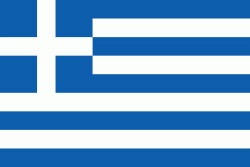Souroti (Sourotí)
Souroti (Σουρωτή), a rural village in the Thessaloniki regional unit of Greece is located 25 km outside of the city of Thessaloniki. In Greece the village is particularly known for the mineral water bottled there. Administratively it belongs to the municipality of Thermi. The Monastery of Saint John the Theologian is situated there, associated with the name of a famous Orthodox religious author and ascetic of the 20th century, St. Paisios of Mount Athos.
Souroti is an immigrant's village, one of the many that were established in Greek Macedonia after the Balkan wars and the population exchange between Greece and Turkey. Shortly before 1912 the area was called "Surukli" (from the Turkish suru which means herd) and was owned by five Turkish land owners (Τσιφλικάδες) who sold their land to Jews from Thessaloniki.
The first Greeks that settled in the area were a vlach family from Vlasti of the Kozani regional unit, the Christos Lolas' family. Although they were originally shepherds, the family sold their sheep to buy the land from the Jews. Their primary occupation was sericulture and they moved to Souroti to take advantage of the local mulberries. At the same time they maintained trade bonds with Jewish silk producers in Thrace. In 1922, after the population exchange between Greece and Turkey about 48 families arrived from Asia Minor originating from Izmir (Σμύρνη), Aydın (Αϊδίνιο), Cius (Κίος), Mudanya (Μουδανιά) and also from Eastern Thrace. Those were educated and they carried their own traditions. In Souroti they worked in sericulture, olive oil production and vine dressing. Between 1928 and 1930 more vlach shepherds came from Vlasti along with 4-5 families of Sarakatsanoi (Σαρακατσάνοι). Land was distributed to the immigrants by the Greek state first in 1914 and later in 1932.
In October 1913, Albanians from Mandritsa (Μανδρίτσα) settled in the village, following a Bulgarian invasion in their home village.
Souroti is an immigrant's village, one of the many that were established in Greek Macedonia after the Balkan wars and the population exchange between Greece and Turkey. Shortly before 1912 the area was called "Surukli" (from the Turkish suru which means herd) and was owned by five Turkish land owners (Τσιφλικάδες) who sold their land to Jews from Thessaloniki.
The first Greeks that settled in the area were a vlach family from Vlasti of the Kozani regional unit, the Christos Lolas' family. Although they were originally shepherds, the family sold their sheep to buy the land from the Jews. Their primary occupation was sericulture and they moved to Souroti to take advantage of the local mulberries. At the same time they maintained trade bonds with Jewish silk producers in Thrace. In 1922, after the population exchange between Greece and Turkey about 48 families arrived from Asia Minor originating from Izmir (Σμύρνη), Aydın (Αϊδίνιο), Cius (Κίος), Mudanya (Μουδανιά) and also from Eastern Thrace. Those were educated and they carried their own traditions. In Souroti they worked in sericulture, olive oil production and vine dressing. Between 1928 and 1930 more vlach shepherds came from Vlasti along with 4-5 families of Sarakatsanoi (Σαρακατσάνοι). Land was distributed to the immigrants by the Greek state first in 1914 and later in 1932.
In October 1913, Albanians from Mandritsa (Μανδρίτσα) settled in the village, following a Bulgarian invasion in their home village.
Map - Souroti (Sourotí)
Map
Country - Greece
 |
 |
| Flag of Greece | |
Greece is considered the cradle of Western civilization, being the birthplace of democracy, Western philosophy, Western literature, historiography, political science, major scientific and mathematical principles, theatre and the Olympic Games. From the eighth century BC, the Greeks were organised into various independent city-states, known as poleis (singular polis), which spanned the Mediterranean and the Black Sea. Philip II of Macedon united most of present-day Greece in the fourth century BC, with his son Alexander the Great rapidly conquering much of the ancient world, from the eastern Mediterranean to the North Western parts of India. The subsequent Hellenistic period saw the height of Greek culture and influence in antiquity. Greece was annexed by Rome in the second century BC, becoming an integral part of the Roman Empire and its continuation, the Byzantine Empire, which was culturally and linguistically predominantly Greek.
Currency / Language
| ISO | Currency | Symbol | Significant figures |
|---|---|---|---|
| EUR | Euro | € | 2 |
| ISO | Language |
|---|---|
| EN | English language |
| FR | French language |
| EL | Greek language |















